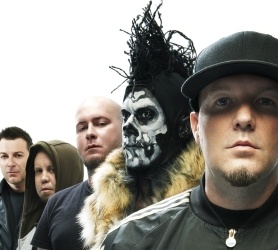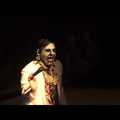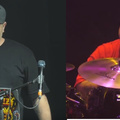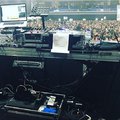A hosszú Songfacts interjú a hajtás után
Greg Prato (Songfacts): When it comes to songwriting, is it usually you by yourself, or do you find that you write your best songs as a collaboration?
Wes Borland: I think that very good songs can be written in numerous different ways. I never know where inspiration is going to come from. I've gotten to the point in my life where I don't try to push inspiration, because I feel like people talk about there being such a thing as writer's block, and I don't agree. I think that writer's block, even though it may feel the same as what I'm about to explain it as, I don't think that it is what people think it is. I don't think it's them not being able to come up with anything. I think it's them forcing themselves to be creative at a time in which they're just not able or shouldn't be creative; like their brain hasn't come up with the correct ideas or the correct way of thinking about what's going on.
Because creativity comes in waves. It's not like a creative person has this constant output. Every creative person I know is very moody - most of them are really strange people. They're very moody, mood swings. A lot of them have manic or bipolar tendencies, and a lot of them have suffered from those symptoms and end up going on medications, like Zoloft or Paxil or things like that to mellow out their highs and lows. But it also takes away their waves of creativity, too.
So when I write songs, when I work, I've gotten to the point of where I don't try to push it unless the big set of "surf" is coming in as far as creativity goes. And I try not to worry or beat myself up when something like that isn't happening. "Eureka" moments just come.
Songfacts: Who would you say are some of your favorite songwriters?
Wes: Wow. I really think Fiona Apple is a great songwriter. I, of course, love Trent Reznor - he's a huge deal to me. Thom Yorke, great songwriter. Linda Perry an amazing songwriter. She's written for so many people.
I would say the King isn't Elvis, because he had so many covers, but probably Prince. Prince is that weird thing where you have an incredible songwriter who's also an incredible showman at the same time. He's just one of those off-the-charts people that makes everything seem effortless. Big Prince fan.
Songfacts: Going back a bit, what do you remember about the writing of the Limp Bizkit song, "Rollin'"?
Wes: "Rollin'" was a collaborative effort with this rap beat maker called Swizz Beatz. On every record, Limp Bizkit will have a couple of these different guys who were hip-hop based music writers come in to write more hip-hop style tracks with us, whether it's "N 2 Gether Now" or any of the tracks that are mixed into our records that are more straight hip-hop, because we like to have a variety of music on Limp Bizkit records that swings back and forth between being more traditional hip-hop and then more traditional rock or metal - like a bunch of songs that tie those two elements together so that people aren't getting just a perfectly balanced meal with every song. It's like an assortment of songs that altogether make the sound up as one on an album.
"Rollin'" was originally going to be just a straight hip-hop song, but after we heard it, we were like, "No, man, we've got to turn this into a rock song." We liked both versions so much that that's what it ended up being, two versions: a hip-hop version of the song and a rock version of the song.
That was when I was getting into really using the tremolo, the Floyd Rose [tremolo system] on guitars. That's when I was really getting into using that as a part of riffs, to make things dive and come back up, and using it to give guitar riffs the bar on the guitar. Instead of using it like a Van Halen style technique, I was actually using it on lower strings and chords, like how you can make the riffs sound when playing with the drums - give riffs this suction push and pull sound that makes everything sound more snappy. That was the first album that I started doing that a lot on, was Chocolate Starfish. And "Rollin'" was, with the [singing sounds], those slide downs, it just lended itself perfectly to my playing at the time.
Songfacts: What do you remember about the writing of "Nookie"?
Wes: "Nookie" happened at the end of another song. On one of the other songs on the album we started jamming. Lethal [Limp Bizkit's ex-DJ] had a beat, and I was playing guitar. We started playing, making up this outro on the spot to a different song, and went, "Whoa, this is really cool," and we made up a quick verse/chorus. And we were like, "Okay, what's the working title of this one going to be called?" The beat was sampled off of an Italian porn movie from the '70s or something, that Lethal had in a library. It was like, "That beat's from a porn movie, we should call this song 'Nookie.'"
Then Fred came in the next day to the studio and I was like, "We've got to show you a song, we're calling it 'Nookie' just for the time being." And he was like, "Okay." And then he flipped out and went, "Dude, that's the name of the song! I'm going to use that as the lyrics." And that was it.
Songfacts: That was it?
Wes: It just sort of came, was one of those things that just kind of went pop and came together unexpectedly at the last second. Sometimes those are the best things that happen that way. I've felt like every album I've ever made, there's always been a song that has been the biggest pain in the ass in the world to get it done. Like, "How are we going to pull this song together?" There's all these obstacles to get through. And then there's always a song that writes itself, where it just goes bam! and it's done.
Songfacts: Let's talk about Black Light Burns. There are two albums that were released in the past year or so: The Moment You Realize You're Going to Fall and also Lotus Island.
Wes: You Realize You're Going to Fall is the way Black Light Burns has the pattern that seemed to happen with that project: we do one album that's like a big album with proper full-length songs, and then we follow it up with some things, not a typical album. It's an alternate soundtrack to the 1973 film, The Holy Mountain, by Alejandro Jodorowsky, and to the first act of the movie, which is the first 40 minutes. There are four proper songs on it, but a lot of tracks on it are related to what's going on and actions going on in the film.
First album we ever put out was called Cruel Melody, which was a proper album, and that was followed by the "palette cleanser" album, I guess, which was called Cover Your Heart, and that was all just covers of mostly lesser-known artists who are big influences on me that I wanted to tip my hat to in a way. It's tough to do both bands: both are so taxing and both of them require so much of my time. Especially Black Light Burns, because it's more of a DIY-type of process where I'm having all the jobs instead of just being a guitar player and an artist and working on songwriting.
So the third album is starting to take shape. I'm starting to have some traction as far as finding a sound and going through things that I'm working on and choosing what might shape the album. But yeah, for the most part, it's a completely different band, it's a completely different identity from who I am and it's a completely different character, and the two couldn't be more different for me. The closest thing that I've thought about as far as comparing how I am in Black Light and how I am as an outsider is Sacha Baron Cohen. I'm not sure what his process is, but it's the difference between doing Borat and Bruno, in a way. Because he completely gets into the inner workings of that character for a long period of time while he's shooting - it's not like he's just changing costume for every single part.
Songfacts: How would you compare the songwriting to Black Light Burns and also Limp Bizkit, maybe, for fans of Limp Bizkit that may be just discovering the band now?
Wes: Well, Black Light, is more on my speed and on my time and at my pace. I work on music all the time. Sometimes I do it for films; sometimes I do it for other artists. A lot of times I'm thinking in Limp Bizkit mode, and then the Black Light stuff will start popping in my head and I go, "Oh, that'd be a good idea for a Black Light song," and I start demoing or sometimes recording a start-to-finish song. It depends, but Black Light, I don't want to say it's never the priority, but it just sort of happens when it happens, and I don't try to force it, because whenever I try to force Black Light, it just doesn't ring true.
With Bizkit it's a much more collaborative writing process. Black Light I'm on my own: it's a lot more like taking a trip by yourself and walking out through a part of the desert or some strange location where you're just exploring and checking things out, whereas with Bizkit it's very hands-on with the other guys, mostly with Fred and I talking about what we're going to do and executing that much more like a team effort.
Bizkit's a lot more proactive songwriting, whereas Black Light, it just sort of flows when it flows. When it doesn't flow I just leave it alone.
Songfacts: Tell me about the Black Light Burns song "Scream Hallelujah."
Wes: Very good songs start with being inspired from a riff, a vocal, or what have you. But "Scream Hallelujah" started with the vocals, the whole thing. The vocals were written before there was any music. The most powerful songs - at least that mean the most to me - are always lyrics first. Then the whole song can be written around the intention of what the vocals are. Instead of going, "What does this song sound like?" I can make up a vocal.
Because if you're just making up music and you're going to put vocals on it later, a lot of times you're just coming up with something that you think sounds cool. Like Limp Bizkit riffs to me, the way those sound, like the slinky sort of whammy bar-ish heavy Limp Bizkit riffs, I can just shit those out all day long without any feeling. Those are just what sounds cool to me. But when it comes to a song like "Scream Hallelujah," the lyrics just wrote themselves, because I was thinking how I would probably kill myself if I was in a 9-to-5 cubicle type of job. I thought about how all these people in the world are looking at their phones all the time at dinner and they're watching reality television and how most of the things that they're talking about conversation-wise are either gossip about other people, or they're talking about a show that they watched.
I started looking at society, sort of Western culture in a way, how privileged we all are and how people are working jobs a lot of the time to just get by, just get through and get to the next day and pay the credit card that they're way in over their head on and they're buying things they don't need. Just the whole way consumerism works. That's why the lyrics just dropped into place: because it was one of those eureka moments. You're watching your television and weeping, and you're just sucking all this stuff up that you're being fed by the media and by the way TV programming works, where it's always keeping you on the hook and never delivering anything that you're actually going to enjoy.
I got cable out of my life in 2005. I spent a couple of weeks where I didn't have it, when I was out of the country, where I had stopped watching TV programming for two or three weeks. And when I came back from having the TV turned off, I went: "I don't want cable anymore. This is a problem." There are so many commercials in my brain, there are so many jingles in my brain, there's all this shit that's taking up space that has been put there that I have:
A) No use for.
![]() What could I be putting in my brain and retaining if I didn't have all of these Geico commercials in my head.
What could I be putting in my brain and retaining if I didn't have all of these Geico commercials in my head.
So I started going on a "brain diet." I have the iTunes store and Apple TV and I've got Netflix, so if I want to watch a show, if I want to select a show and it's my choice to watch it, I can do that. I think a lot of people are starting to do that now, but now commercials are coming to YouTube and stuff like that. So whenever a commercial comes on, I mute it and don't look, because I don't want to see shit that I don't need to see.
"Scream Hallelujah" was a lament; it was a very sarcastic lament encouraging people to just stay on the tracks that they've been put on, stick to the ideals that their parents instilled in them as they were growing up. Don't stay inside and watch that shitty show over and over again until you're unable to breathe in the plastic bag that you put over your head to kill yourselves.
It's almost like worshiping Western culture and how just fucked it is, not in a paranoid way where I think that they're putting something in the water that's brainwashing everyone, but they're definitely putting something through our televisions and through the food we're eating and through fashion magazines and through insane maniac, everyone panic type of media. Giving people all this stuff to worry about and talk about that really doesn't matter at all. People are basing their whole lives on it, so it's almost like a religion.
So that's where the "Hallelujah" thing came into it. People need to wake up and just go kayaking or something, or go camping, or just turn their fucking phone off. When you're at dinner, everybody stack your phones in a little stack in the middle of the table and stop looking at them and start having contact with human people again and have conversations that don't have to do with the show that you saw last night.
"Scream Hallelujah" is like I'm begging you guys to stop filling your brains with all this bullshit, because...
Okay. I'm done. Sorry to just rant and rant and rant about it. It's something I'm very passionate about.
Songfacts: I have to say, I totally think that you're right about that. And also something else that I can't stand is reality TV that's also not based at all on reality, which seems to be very rampant.
Wes: Right. Exactly. It's like faking real shows and that's terrible.
I stopped watching TV, but you can't avoid television because someone always has it on. Someone I know always keeps the TV on at their house. It's always on. It's just going, going, going.
I don't know if they like the background noise or what it is, but I noticed how every single thing that is ever on television is the fishhook to pull you through the advertisements with no payoff except setting the next fishhook up to pull you through all the advertisements. And TV shows never end. There's not Act I, II, and III, and then it's wrapped up and you go, "Wow, I really liked that movie! That was a ride!" TV shows are like a roller coaster that you just keep cranking up and you never get to the top of the first drop. It's just constant lies. Like, "Stay tuned, because we're going to show you this next." I noticed that when watching television shows, even on Netflix, some of the shows I was choosing to watch, I had no memory of what happened on the episode. I was thinking, "What happened two episodes ago?" I don't know, because the way that it's set up, it makes no impact. It was shutting my brain down into some kind of hypnotic state to where I'm just watching and not being fulfilled in any way, except that it's just putting me on standby or something. It's really weird.
Songfacts: Can you talk a little bit about the Black Light Burns videos for "The Moment You Realize You're Going to Fall" and "How To Look Naked"?
Wes: Those two videos are tied together and one and the same, even though they're two different songs. I met a girl named Agata Alexander, who was a fan of the work that I had done with Black Light Burns. She didn't know it was "the dude" from Limp Bizkit who was doing Black Light Burns. She wasn't a Bizkit fan and she found Black Light on her own, and then only later realized that it was my project. Then she found out that we had a bunch of mutual acquaintances.
Black Light's her favorite band ever, so this super-creative person came to me and was like, "I'm a big fan of Cruel Melody and I loved Cover Your Heart. And I went, "Whoa, you loved Cover Your Heart? That record sucks!" And she was like, "No, no, I love it. Please consider me for working on the videos."
A year went by and when I actually decided to finish the Black Light record and I saw the window of time I was going to have - which was like a nine month window to put the album out and tour - I called her up and we met. It was just click right off the bat. Her ideas and my ideas fit together really well, and one of the first proposals that she gave after I gave her the album was pretty much where it needed to be - I don't think it was mastered, but it was mixed. She'd listened to it a bunch and she said, "I think that we should do an introduction video with the title track where you come out of the ocean." We were like, "Well, how am I going to come out of the ocean?" And she says, "Just like a static shot of the ocean for a long time, and then we're going to figure out a way to get you to just come out of the ocean."
So it was like, "Okay." I loved it. I loved the idea. It ended up being a scuba diver - we were going to need someone to be under the water with me for me to stay under the water for an extended period of time. That's one of the hardest things I've ever had to do. It sounded a lot easier on paper, but once we were out there doing it and I'm freezing and wearing all these clothes...
I didn't realize how cold it was going to be. It's a public beach north of LA but we had to go in before it was open, so we're jumping the fence with all the camera gear and sneaking down to the beach. It was an adventure and it was super hard to do as far as how close I think I came to drowning while we were doing that. But it ended up turning out great, so we were super happy. The whole crew for that video was four people total, including me.
And then "How to Look Naked" was a much bigger undertaking. There were a lot people involved and we pulled a lot of favors. That video was only four days of actual shooting, but they happened over a month-long period of time. We shot the main part in a 48 hour period and then added a lot of stuff, like the underwater stuff. It's amazing how hard it is to shoot underwater. Whenever water gets involved, there are so many added factors, and when you start talking about putting lighting under water, that's a whole new thing, too. And it's frightening - you're running waterproof power cables into a pool and going, "You touch it," "No, you touch it." "You touch the surface of the water." Just to see if you're going to get electrocuted or not.
But it was one of the things where everything just fell into place, and we got all these great people who wanted to help and come together. The videos were thought up over three or four hangout sessions of Agata and I just talking, having a couple of drinks. And that was it. Boom, done. Boom goes the dynamite.
Songfacts: I thought the coolest scene in it, and probably the creepiest scene, is when the reflection of the water is in your eye.
Wes: Oh, yeah, yeah. Thanks.
Songfacts: I recently saw you on an episode of the TV show Oddities. What are some of the pieces of your collection of artifacts that you're most proud of?
Wes: Well, on Oddities we talked mostly about my Peruvian skull, which is my stretched head skull, where they did head binding in Peru. The natives in that culture found that beautiful for some reason. I don't really want to know the whole story of how they all came into the possession of the dealer, but I acquired a Peruvian skull through a dealer here in LA. I was just happy to get one. And Danny Carey and Adam Jones from Tool both got one. They really freak people out. I love it. It's one of my favorite pieces.
And mine was also broken - I was moving from one house to another, and somewhere during the move, someone stepped on the box that my skull was in and destroyed it. I had to build it back over a 6 month period of time; I had to very carefully research glues. I was calling museums and trying to figure out what would be the best method, because it's 2,000 years old - parts of it are crumbling like soil because it's so old the bone is just not held together well.
So I ended up taking a roll of paper towels and then a plate and just putting Elmer's glue in the plate and basically Papier Mâchéing inside of the skull to give it some kind of structure to hold together. And Elmer's glue, that might not sound like the strongest thing in the world, but it's very good for delicate things, and it isn't toxic or anything like that.
Anyway, that skull has been my favorite piece. And it breaking and then having to rebuild it kind of brought me closer to it, in a way.








